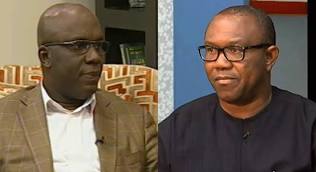The political arena in Nigeria has taken another dramatic turn as Felix Morka, the National Publicity Secretary of the All Progressives Congress (APC), revealed that he and his family have been inundated with death threats following his comments about Labour Party presidential candidate, Peter Obi.
Morka, speaking on Arise Television on Wednesday, stated that he has documented over 400 threats, of which about 200 were explicit death threats. These threats, he claims, were spurred by Obi’s public accusation that Morka’s remarks during a previous interview constituted a threat to his life.
“Gruesome and Graphic Threats”
The APC spokesman recounted the chilling details of the threats, some of which included graphic descriptions of violence.
“In these messages, individuals have detailed how they plan to harm me—threatening to shoot me, behead me, and carry out other gruesome acts,” Morka stated. “This is not mere rhetoric. It has even extended to direct threats against some members of my family.”
Morka categorically denied Obi’s allegations, describing them as baseless and an attempt to stoke political tension.
“This entire situation is baseless and cannot be attributed to me. I did not threaten Peter Obi in any way. Those issuing these threats are acting on their own, but I trust that law enforcement will respond swiftly to bring them to justice,” he said.
How It Started
The controversy began during a Sunday interview on Arise Television, where Morka criticized Peter Obi’s approach to addressing national issues. Morka accused Obi of “crossing the line” with his comments about President Bola Tinubu’s administration and suggested that Obi “deserved whatever came his way.”
These remarks were met with outrage, particularly from Obi’s supporters and political allies. The Labour Party and opposition figures accused Morka of making inflammatory statements that could incite violence.
Political Fallout
The backlash was swift and unrelenting. Former Vice President and Peoples Democratic Party (PDP) presidential candidate Atiku Abubakar condemned Morka’s remarks, demanding that the APC apologize to Obi and the Nigerian public.
“This kind of inflammatory and disgraceful language has no place in our political discourse,” Atiku stated in a press release.
Similarly, the Labour Party issued a seven-day ultimatum to President Tinubu, insisting that Morka be reprimanded for his statements. Marcel Ngogbehei, the Director-General of the Labour Party Directorate of Mobilisation and Integration, accused the APC of orchestrating a “targeted campaign” against Obi following his New Year’s State of the Nation address.
“This relentless assault on Obi’s person and political credibility is a clear indication of desperation,” Ngogbehei said in a statement on Tuesday.
Morka’s Defense
Despite the mounting criticisms, Morka maintained his innocence, insisting that his comments were being misconstrued. He expressed concern over the threats to his life and his family’s safety, urging law enforcement agencies to take immediate action.
“I trust that law enforcement will take these threats seriously and ensure that those behind them are brought to justice,” Morka said. “No one deserves to live under such fear, especially over baseless accusations.”
The APC spokesman also emphasized his commitment to free speech and constructive political discourse, urging Nigerians to remain civil in their engagements.
A Pattern of Political Tension
This incident is the latest in a series of political altercations involving Peter Obi and his supporters. Since the conclusion of the 2023 presidential elections, Obi has been vocal in his criticism of the APC-led administration, often drawing sharp responses from ruling party officials.
Observers have noted that the heated exchanges between Obi and the APC reflect a broader trend of escalating political rhetoric in Nigeria. Analysts warn that such inflammatory language could undermine the country’s democratic stability, especially as the 2027 elections draw nearer.
Calls for Restraint
Amid the controversy, civil society organizations and political analysts have called for restraint on both sides. They argue that the focus should be on addressing Nigeria’s pressing issues, such as economic recovery, insecurity, and national unity, rather than engaging in personal attacks.
“There is a need for all political actors to tone down the rhetoric,” said Dr. Oladele Akinyemi, a political analyst based in Lagos. “The kind of language being used in these exchanges only serves to inflame tensions and distract from the real issues facing the country.”
A Legal Path Forward
As the situation unfolds, Morka has indicated that he plans to submit the documented threats to law enforcement agencies. Legal experts suggest that the case could serve as a litmus test for the ability of Nigerian authorities to handle politically motivated threats and intimidation.
“This is an opportunity for the Nigerian Police Force and other security agencies to demonstrate their impartiality and commitment to justice,” said Barrister Nneka Obiora, a Lagos-based legal practitioner. “Threats of violence, whether verbal or written, should be dealt with decisively, regardless of the political affiliations of the individuals involved.”
A Test of Democracy
For many Nigerians, this controversy underscores the challenges facing the country’s democracy. The interplay of free speech, political accountability, and security concerns remains a delicate balancing act.
As Morka awaits action from law enforcement, the public will be watching closely to see how the APC, Labour Party, and other political stakeholders navigate this crisis. For now, the political rhetoric shows no signs of cooling down, and the stakes for Nigeria’s fragile democracy have never been higher.

